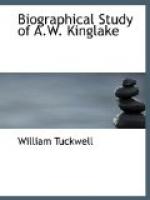Russophobia was at that time so strong in London that Madame Novikoff hesitated to visit England, and he himself feared that she might find it uncomfortable. Her alarm, however, was ridiculed by Hayward, “most faithful of the Russianisers, ready to do battle for Russia at any moment, declaring her to be quite virtuous, with no fault but that of being incomprise.” But he groaned over the humiliation of England under Russia’s bold stroke, noting frequently a decay of English character which he ascribed to chronic causes. The Englishman taken separately, he said, seems much the same as he used to be; but there is a softening of the aggregate brain which affects Englishmen when acting together. He hailed the great Liberal victory of 1880, and watched with interest, as one behind the scenes, the negotiations which led to Lord Hartington’s withdrawal and Mr. Gladstone’s resumption of power; for in these his friend Hayward was an active go-between, removing by his tact and frankness “hitches” which might otherwise have been disastrous. He thought W. E. Forster’s attack on Mr. Gladstone’s Irish policy in 1882 ill-managed for his own position, his famous speech not sufficiently “clenching.” Had he separated from his chief on broader grounds, refusing complicity with a Minister who consented to parley with the imprisoned Irishmen, he would, Kinglake thought, have occupied a highly commanding position. At present his difference from his colleagues was one only of degree.
He was once beguiled, amongst friends very intimate, into telling a dream. He dreamed that he was attending an anatomical lecture— which, as a fact, he had never done—and that his own body, from which he found himself entirely separated, was the dissected subject on which the lecturer discoursed. The body lay on a table beside the lecturer, but he himself, his entity, was at the other end of the room, on the furthest or highest of a set of benches raised one above the other as at a theatre. He imagined himself in a vague way to be disagreeing with the lecturer; but the strongest impression on his mind was annoyance at being so badly placed, so far from the professor and from his own body that he could not see or hear without an effort. The dream, he pointed out, showed this curious fact, that without any conscious design or effort of the will a man may conceive himself to be in perfect possession of his identity, whilst separated from his own body by a distance of several feet. “The highest concept,” said Jowett, “which man forms of himself is as detached from the body.” ("Life,” ii. 241.) The lecture-room which he imagined was one of the lower school-rooms at Eton, with which he had been familiar in early days.




